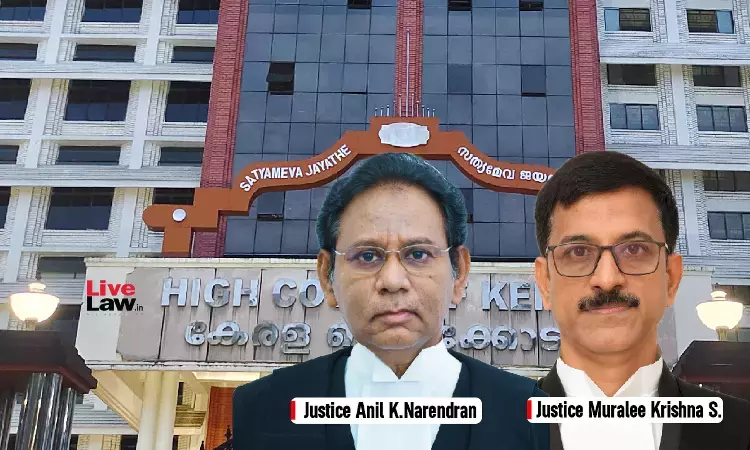- Home
- /
- High Courts
- /
- Kerala High Court
- /
- Appeals U/S 19 Of Contempt Of Court...
Appeals U/S 19 Of Contempt Of Court Act Can Only Be Against Order Imposing Punishment, Framing Of Charges Not Appealable: Kerala High Court
Manju Elsa Isac
4 March 2025 7:40 PM IST
The Kerala High Court observed that an appeal under Section 19 of the Contempt of Court Act will lie only in cases when the order is connected and incidental to the order of punishment for contempt. The Division Bench, comprising of Justice Anil K. Narendran and Justice Muralee Krishna S. held that there should be an order of punishment preceding the order which is being appealed. The court...
The Kerala High Court observed that an appeal under Section 19 of the Contempt of Court Act will lie only in cases when the order is connected and incidental to the order of punishment for contempt. The Division Bench, comprising of Justice Anil K. Narendran and Justice Muralee Krishna S. held that there should be an order of punishment preceding the order which is being appealed. The court said that proceedings to frame charges for contempt is not appealable under the Act.
“Hence, the scheme of Section 19 of the Contempt of Courts Act, 1971, the Rules framed thereunder, and the decisions of the Apex Court, particularly in the case of Midnapore Peoples' Co. op Bank Ltd., indicate that only those orders which are inextricably connected to and incidental to the order of punishment can be the subject matter of an appeal along with the order imposing punishment. To reiterate the phrase inextricably connected or incidental 'to the order of imposing punishment' mean that there must first be an order of punishment. Proceeding to framing charges of contempt is thus not appealable under Section 19(1) of the Act.”
Background of the Case
A writ petition was filed before the High Court by retired personnel of Assam Rifles seeking parity in the pay scales as their counterparts in other paramilitary forces. The High Court ,relying on the law laid down by a Division Bench of the Gauhati High Court held that the petitioners are entitled to get their pay scale re-fixed and to get arrears of pensionary benefits. An appeal against this judgment was preferred which was dismissed. A review petition was subsequently file,d which was also dismissed.
A contempt petition was filed saying that the writ petitioners were not given the benefit under the judgment of the High Court. The Court noted in its order that the directions in the judgment has not been complied with and directed compliance within 8 weeks. The Court said that if the directions are not complied with, the respondents of the contempt case will have to appear in person and show cause as to why action shall not be taken against them.
The respondents filed an interlocutory application seeking to vacate the order directing compliance saying that the Gauhati High Court judgment was not applicable to the petitioners of the writ petition. The High Court after considering the arguments of both sides, dismissed the interlocutory application.
The instant appeal was filed by the respondents in the contempt case under Section 19 of the Act. They appealed the order of the Single Bench directing compliance and the order dismissing the interlocutory application.
Observations of the Court
The Court relied on its own decision in Suni B. T. v Vinayaka Granites (2024) which held that an order by which the court proceeds to frame a charge under Section 14(b) of the Contempt of Courts (High Court of Kerala) Rules is not appealable under Section 19.
In Midnapore Peoples' Co. Op. Bank Ltd v Chunilal Nanda (2006), the Supreme Court held that what is appealable under the Act is an order imposing punishment for contempt or an order or direction incidental or inextricably connected with the order of punishing for contempt. The High Court observed that as per this condition an order in the contempt proceedings when there is no order punishing for contempt is not appealable under the Act.
In Midnapore Peoples' Co. op Bank Ltd, the Supreme Court had also held that if the High Court decides an issue or makes any direction relating to the merits of the dispute between the parties, such order can be challenged in an intra-court appeal, if the order is made by a Single Judge and there is a provision for intra-court appeal. The High Court observed that as per this, the parties can explore the option of filing a writ appeal under Section 5(i) of the Kerala High Court Act. The Court added that such a writ appeal will be listed before a Division Bench as per the roster and not before the Division Bench dealing with contempt petitions. The Court specifically mentioned that it has not made any remark on whether the instant order is appealable under Section 5(i) of the Kerala High Court Act.
Counsel for the Petitioners: Advocates T. C. Krishna (SCGC), Suvin R. Menon, ARL Sundaresan (ASGI)
Counsel for the Respondents: Advocates John K. George, P. P. Biju, Santhosh Mathew (Sr.)
Case No: Con.App.(C) 1/ 2025
Case Title: Lt. Gen Sukhdeep Sangwan and Others v Bijukumar S. and others
Citation: 2025 LiveLaw (Ker) 154
Click Here To Read/ Download Order



